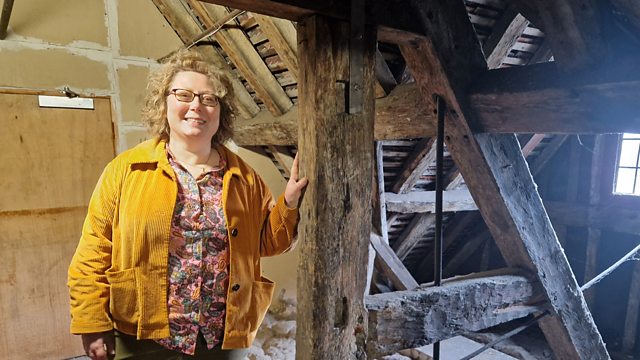The Hidden History of the Attic
Rachel Hurdley discovers how this shadowy part of the home has been used over the centuries and what this reveals about changing attitudes to memory, mystery and materialism
Rachel Hurdley climbs up into the attic to discover the hidden meanings behind this shadowy and mysterious part of the home.
The attic can be a strange part of the house – somewhere which is rarely visited and often forgotten. But it can also be a place to preserve precious memories, a refuge, or even somewhere a bit sinister.
Rachel reveals the many uses to which attics have been put over the centuries and what this tells us about our history and changes in society.
Attics are a relatively recent development and Rachel starts at the 16th-century King’s House within the walls of the Tower of London. The building has some of the earliest attics in the country and she finds out about the social changes which led to this innovation in domestic architecture.
But it wasn’t long before people realised that, as well as being handy for storage, attics could be the perfect hiding place. At Harvington Hall, Rachel uncovers the role that the Hall’s attics played in the religious turmoil of Elizabethan England.
As well as being used for storage or living, attics have often provided working space. Rachel travels to Newtown in mid-Wales to see the attics of an unusual early factory and hears about the arduous working lives of the weavers who toiled there.
The 19th century saw something of a heyday for the attic. The Victorians were all too aware of social class and this meant that servants (and sometimes children) could be banished to attic bedrooms and nurseries. But this was also the height of the Industrial Revolution, with factories mass producing all manner of goods. People suddenly had far more ‘stuff’ – and of course they needed somewhere to put it all. At Scotney Castle in Kent, Rachel explores the attics of a grand country house whose owners spent more than a hundred years cramming them with thousands of objects.
And what of the attic today? In an age of smaller houses, loft conversions and flats, how do we cope without an attic? Rachel enters the world of self-storage where you can store as much as you like for as long as you like.
As she picks through the attic’s contents, Rachel also considers how writers have used attics as a sometimes sinister setting for their characters, and the psychology of what we choose to keep in our attics.
Interviewees:
Sonia Solicari, Director of The Museum of the Home
Jonathan Glancey, Architectural Writer and Historian
James Wright of Triskele Heritage, spoke at the King’s House, Tower of London
Phil Downing, Hall and Programmes Manager, Harvington Hall
Lola Jaye, Author of The Attic Child
John Evans, Curator, Newtown Textile Museum
Helen Davis, Collections and House Manager, Scotney Castle
Sophie Bagnall, Marketing Director, Attic Self Storage
Presenter: Rachel Hurdley
Producer: Louise Adamson
Executive Producer: Samir Shah
A Juniper Connect production for ����ý Radio 4
Last on
Broadcasts
- Sun 23 Apr 2023 13:30����ý Radio 4
- Tue 25 Apr 2023 11:30����ý Radio 4

